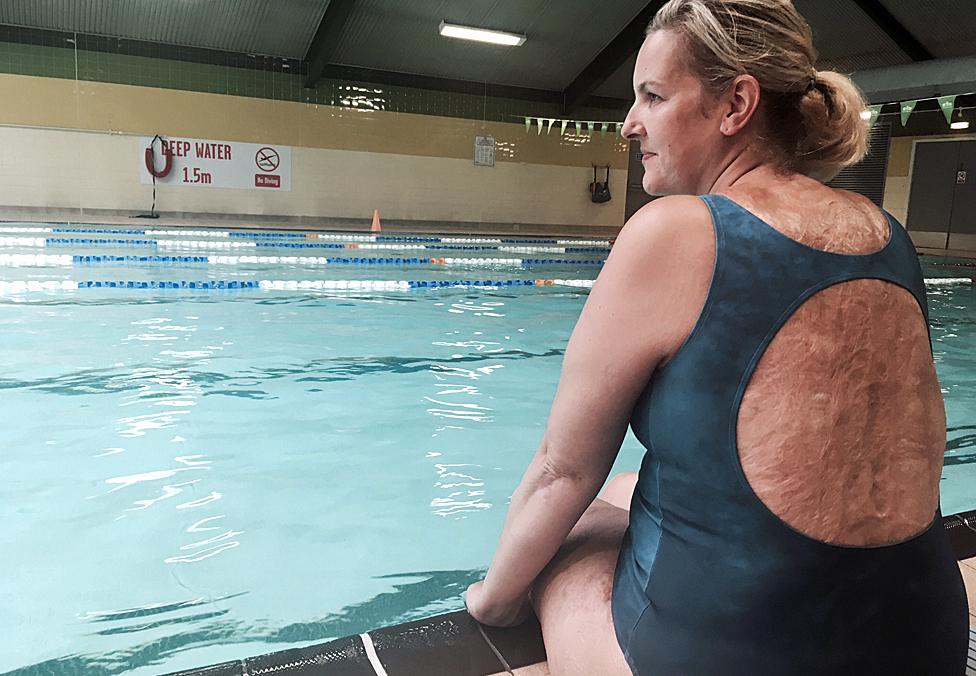'Why I stopped hiding my scars'
- Published
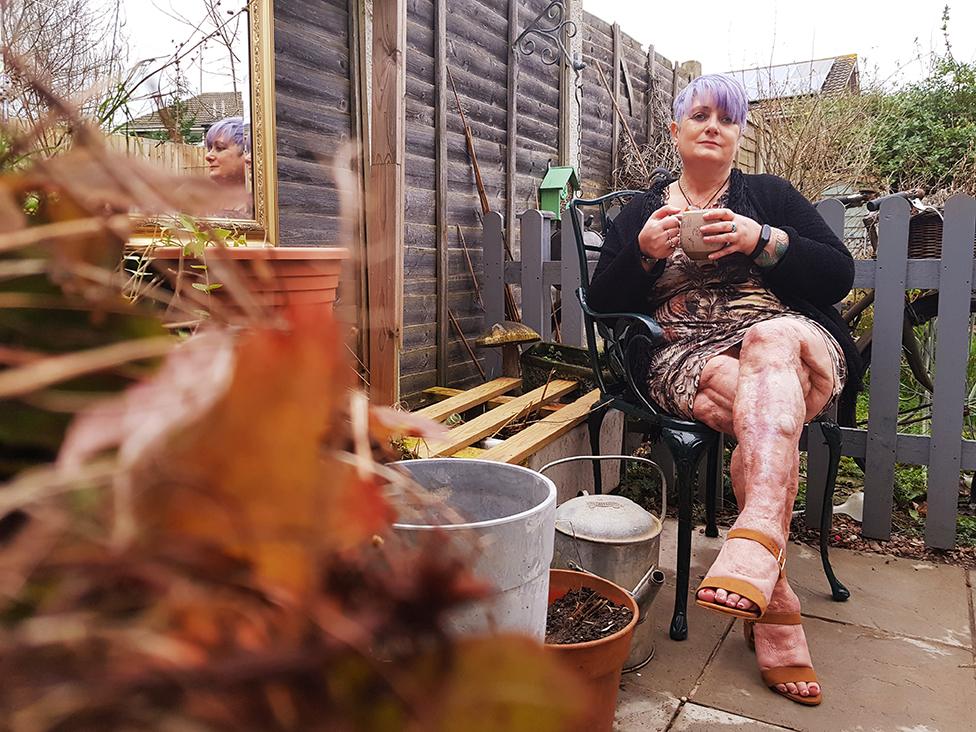
Jayne sitting in her garden

Jayne, Emily and Laura have one thing in common - they all have scars. Aimee, for her part, has flare-ups of psoriasis that can leave her face covered in red patches. But all four have come to feel comfortable in their own skin.
'My legs looked like I'd come straight from The Walking Dead'
Following surgery, I got a flesh-eating bug (necrotising fasciitis) which ate away at my legs from my mid-thigh down to my feet. Initially, there was no flesh on my bones from my leg down. They took skin from my back, my bottom, and my stomach and they've replaced all the skin from my thigh down, which looks a bit like reptilian skin. To get the amount of skin they needed, they had to stretch it like a web to make the skin bigger - like through a pasta machine.
I had a condition called lipoedema. It's predominantly women that get it and it's abnormal fat cells from the waist down. I was on top about a size eight to 10 and then on the bottom an 18 at one time. I lost a lot of weight, but it doesn't diet or exercise away and it's very painful. I started going back and forth to the GP about eight years ago, and then was told that this condition wasn't treatable on the NHS. In 2017 I got the courage to go and have some surgery on it.
I'd gone into it so excited about having this great life, being able to just wear normal clothes, which I hadn't been able to before, and then about five days after I had the second surgery, I became very, very ill. The next thing I remember, I woke up to find that I'd been in a coma and I was totally delirious and I had psychosis and I thought everybody was robots. I thought I was in the hospital for medical experiments and it was just absolutely terrifying. My family had been there, they didn't think I was going to survive the night, and they'd had to sign a consent, because they thought they were going to have to amputate both of my legs. It was a very scary time.
It was about six-seven weeks in before I actually saw what my legs looked like and it was a huge shock. They just looked like two pipe cleaners. For somebody that wanted to have slim legs, my legs looked like I'd come straight from The Walking Dead. In some ways, mentally, it's been really tough because I've got PTSD (post-traumatic stress disorder), especially to do with anything medical.
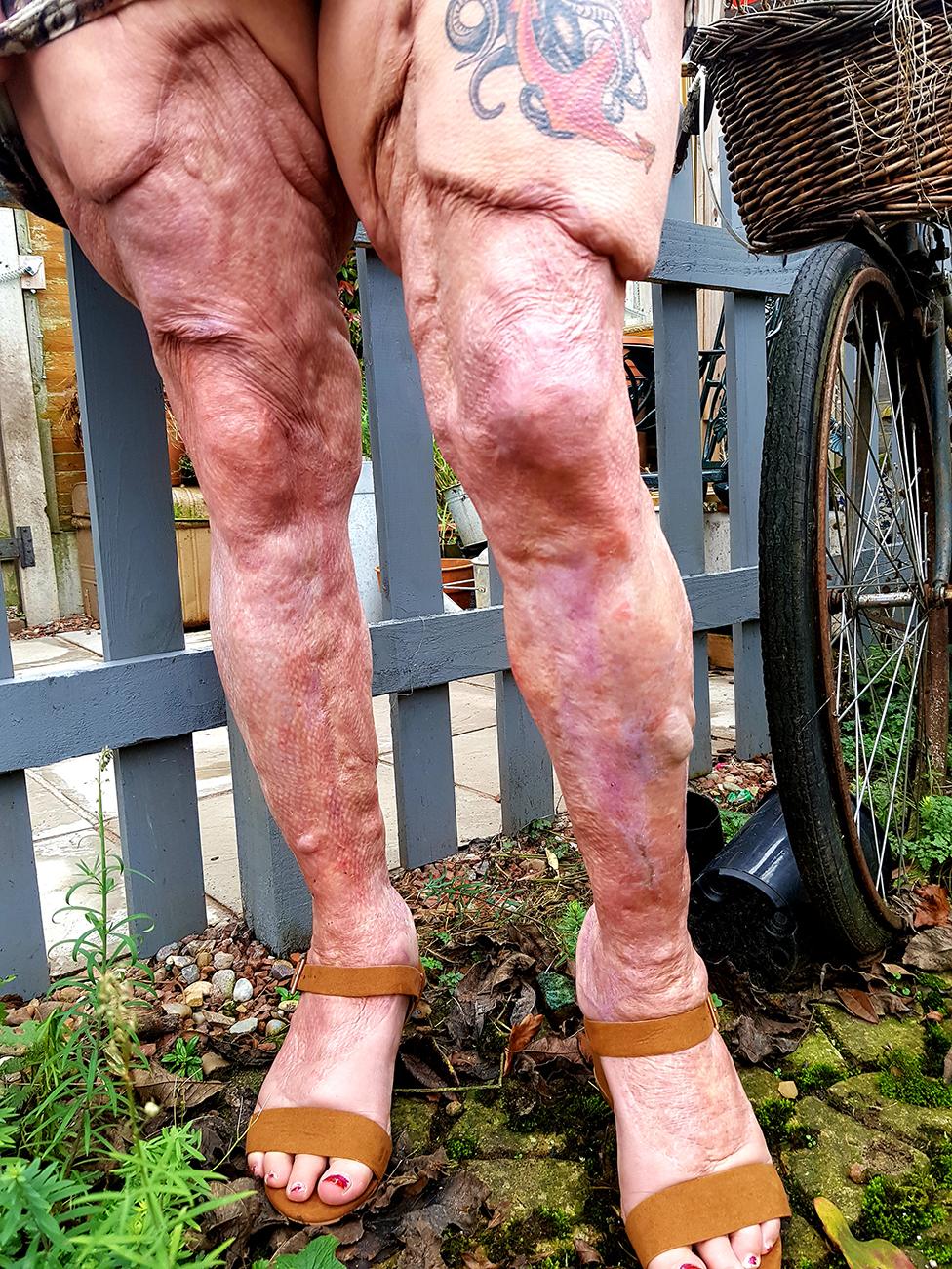
But actually what it has done is it's really made me appreciate my life more. I've gone through a spell of trying really hard to do lots of things in case one day something happens and I'm not here any more. I want to tick as many things off that bucket list as I can. I haven't been to the Moulin Rouge in Paris, or the Orient Express. I want to visit Petra, want to go to Amsterdam. I'm not sure about the mile-high club, if [my partner] Carl's up for that one, but it's on there regardless.
It isn't always easy. I'm not always happy and it's changed my personality. Then I just dust myself off and I go into the next day with a "Right that's it, we're going to do this."
Jayne, 49, from Shropshire
'It represents a lot of pain, but also a lot of overcoming'
My scar's on my right hand, quite close to my wrist. It's a bit raised off my skin. To the touch, it feels a bit hard, a bit lumpy in some areas, soft in areas, and in terms of its colour, it's a bit darker than my shade. In my life I have self-harmed three times on my arm and it's all been on the same area. It's because I didn't want to get any more scars on a different part of my body.
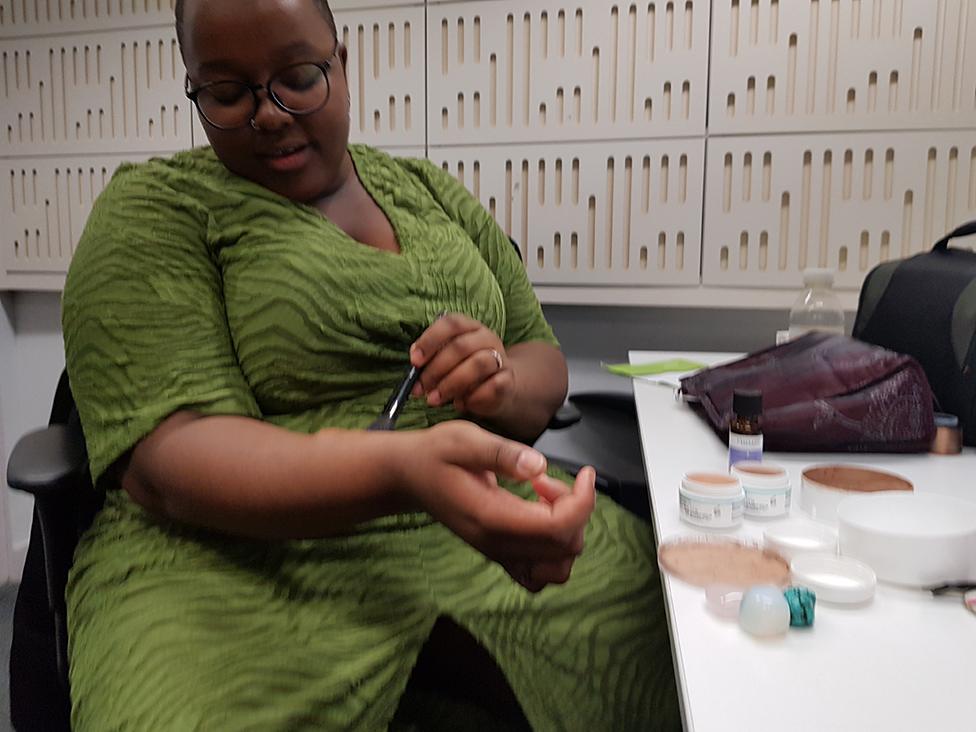
The last time I self-harmed was a year and a bit ago. I've had this scar since I was about 15, so it's been 10 years. It represents a lot of pain, but it also represents a lot of overcoming, because I think why I can smile now is because I'm not in the place I used to be.
I'm in therapy at the moment and self-harm is something that we talk about. It was inflicted, but I don't see it as I harmed myself. I see it as I had a lot of pain inside and I didn't know how to deal with it.
The reason why I self-harmed the first time is because I did something really bad. I shoplifted here and there, and of course the day I steal the most things is the day I get caught. I thought I need to get punished for it.
Jayne, Emily, Laura and Aimee spoke to reporter Ena Miller, for Woman's Hour on BBC Radio 4
Listen to Aimee on Thursday 13 August at 10:00, catch up later online or download the Woman's Hour podcast
When I first got my scar, I went to so much effort to hide it, wearing long-sleeved skin-tight tops in the summer, and it's boiling and you're sweating and you're so uncomfortable. The reason why I hid it is I thought everyone's going to look at it, people think they're entitled to touch, and ask intrusive questions. I'd essentially be telling every stranger that asks me about my mental health and self-harm, I just wouldn't want to do that. I think especially with the stigma of self-harm, you tend to get this really shocked look and its either disgust or it's someone feeling incredible pity for you. Both reactions I completely hate, so for me it's just easier to say, "Yeah, I got burnt."
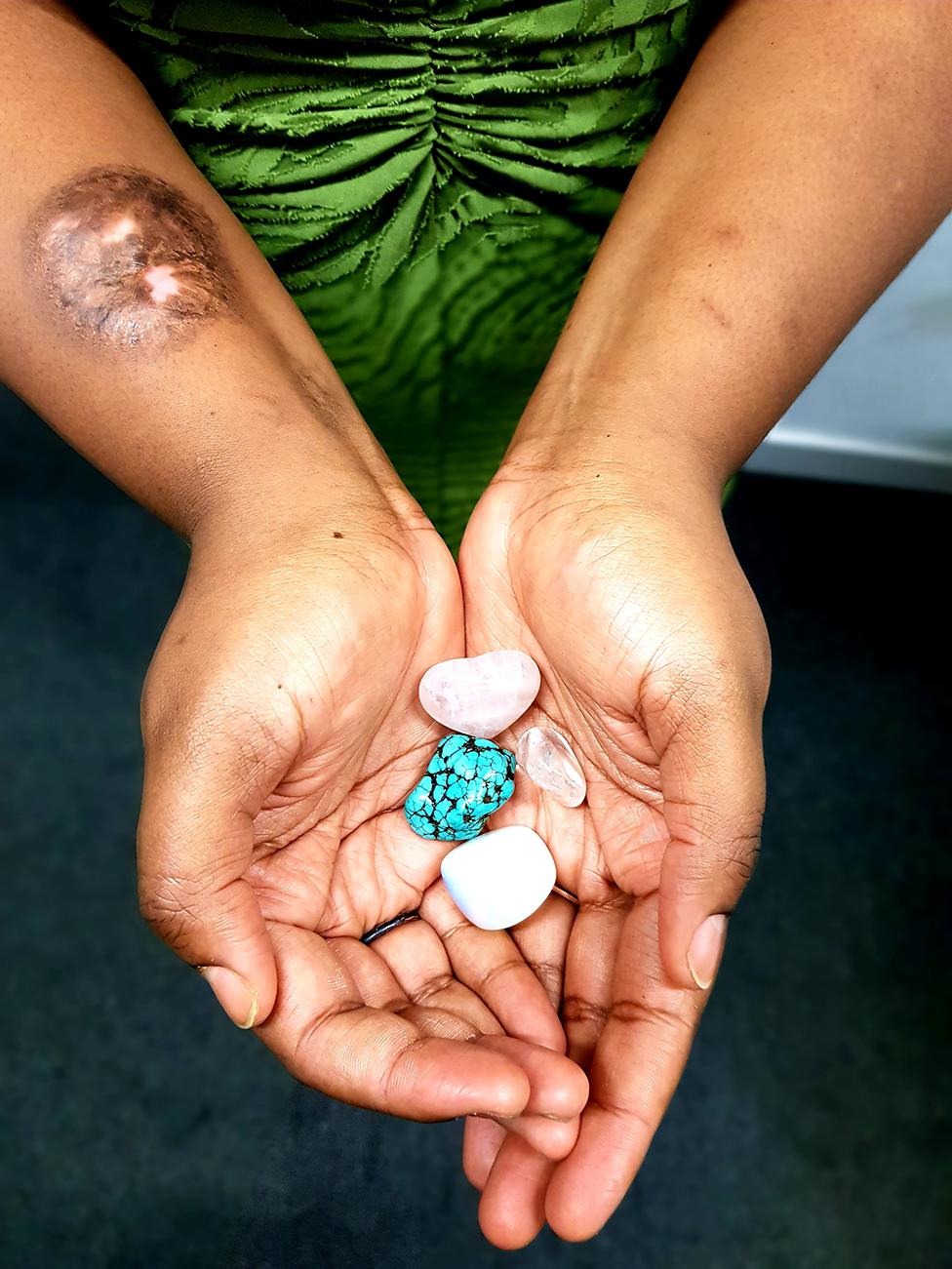
The shift for me happened a few years back and I think it coincided with me just getting tired of being so hard on myself. My needs mattered more than what other people might say. I feel like I started becoming more honest, knocking down that stigma from within. Then it allowed me to get to that point where I was like, "Actually, I'm going to show my scar, it's going to be out there." And if people look at it, and if people say something, that's OK.
Emily, 25, from London
'I've always said that my scars look like crumpled up tights'
From my bellybutton down to my toes, I've always said that my scars look like crumpled up tights.
It does make me feel uncomfortable sometimes, because you think people are going to notice because you are oddly shaped. If I'm going to Cardiff shopping, people will stare at you.
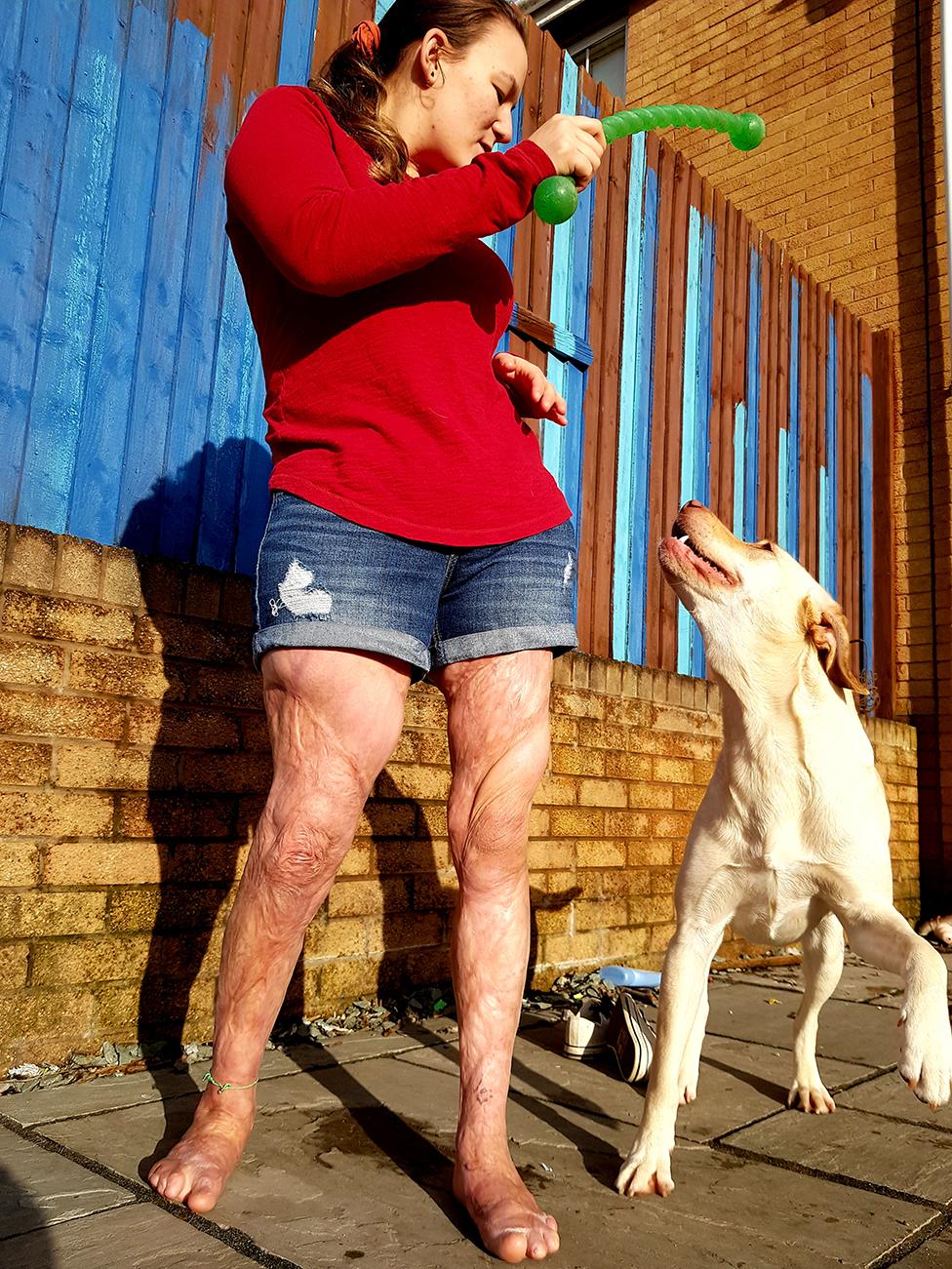
I like to be labelled as a burns survivor, because you're not a victim, but you are a survivor of what happened in the accident, and you've come out stronger.
When I was about one, a non-member of my birth family put me in the bath, and my birth mum came in and saw what happened. She dialled 999. It was scalding water. I got removed from my birth family and I'm adopted with amazing parents.
As a child, it was hard because you get children who will be nasty. I remember this one lad and he said I had zombie legs and that basically I should have died in the bath. I remember my first day of high school, I wore a skirt with high socks and these horrible little clodhoppers. At the age of 15-16 years I started wearing trousers, so I just hid it all. I went really quiet. I didn't have the confidence to talk to people. I had very close friends, and that's the way I dealt with it. I hid myself as well from the world and then at about 18-21 years I decided, "I'm me."
I had a lot of talks with people at this adult burns club, and the children's burns club as well, and I heard a story from somebody else and I thought, "My life's not that bad." Everybody accepted you for who you are, and that was really nice because then you could show off your burns, you could tell your stories, encourage each other.
I was about 25 and there was about eight of us in a row on a beach in swimsuits, all with different burns and from all walks of life, and we thought, "We're going to post this on Instagram, because we're going to show people that we're brave, and that it's all right to talk about your burns and open up."
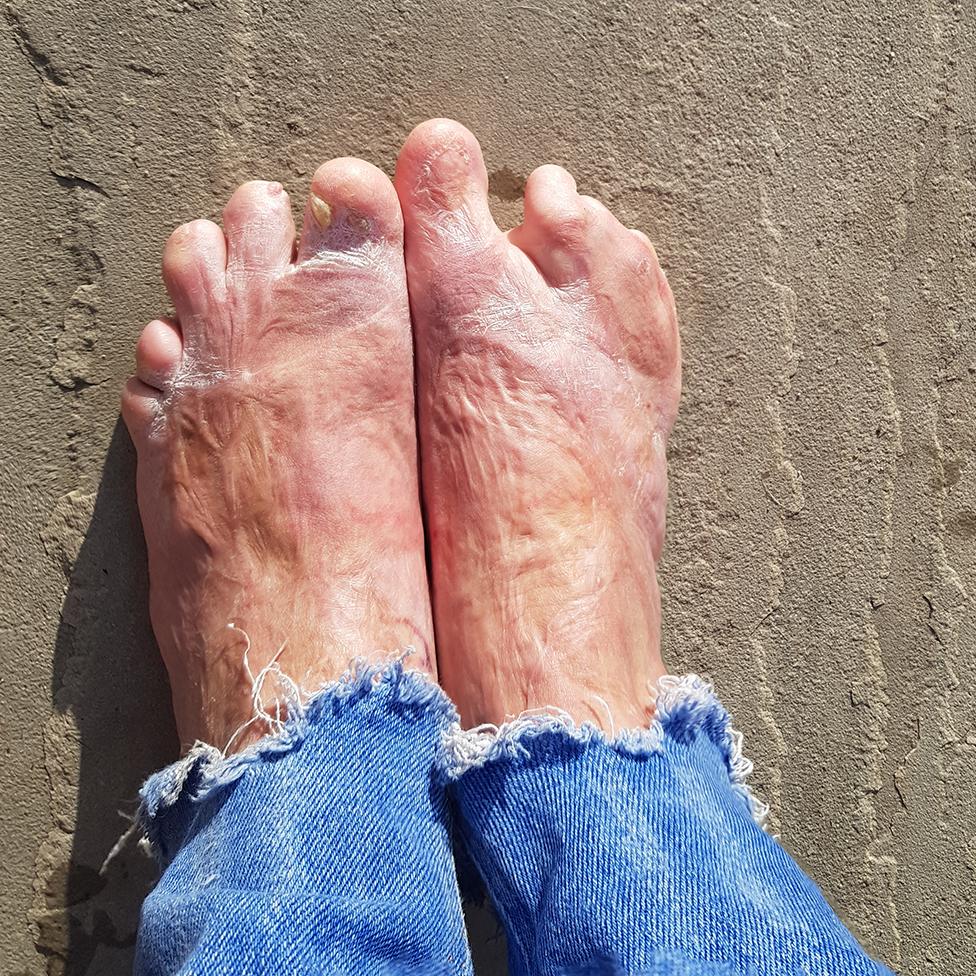
I was in a beauty pageant. It was the first ever beauty pageant for people who've got differences and uniqueness. I want young people to look up to me as a role model and think, "If she can do it, I can do it, I can get out of my shell."
Explaining to my partner that I'm with now was hard. I was nervous. When he first saw my scars he was a bit shocked, and he thought, "How can somebody do this to a person?" He hasn't asked any questions since we met and that was three years ago. So it is all normal, but because the skin on my belly is so skin-tight, I'm afraid to have kids because of it. He wants kids in the future, and I was scared that I couldn't give it to him. It may be possible, but we'll have to wait and see.
One day I'm hoping to have kids, but at the moment I've got my dogs.
Laura, 27, from Caerphilly
'I couldn't cope with that feeling in the morning of remembering how I looked'
It's been a few weeks since I've had a psoriasis flare up. My skin's looking really great at the moment. I still have patches on other bits of my body. Strangely, I've taken lots of photos of my skin during a major flare up and I have had those photos even printed. It's just to remind myself of what my skin can be.
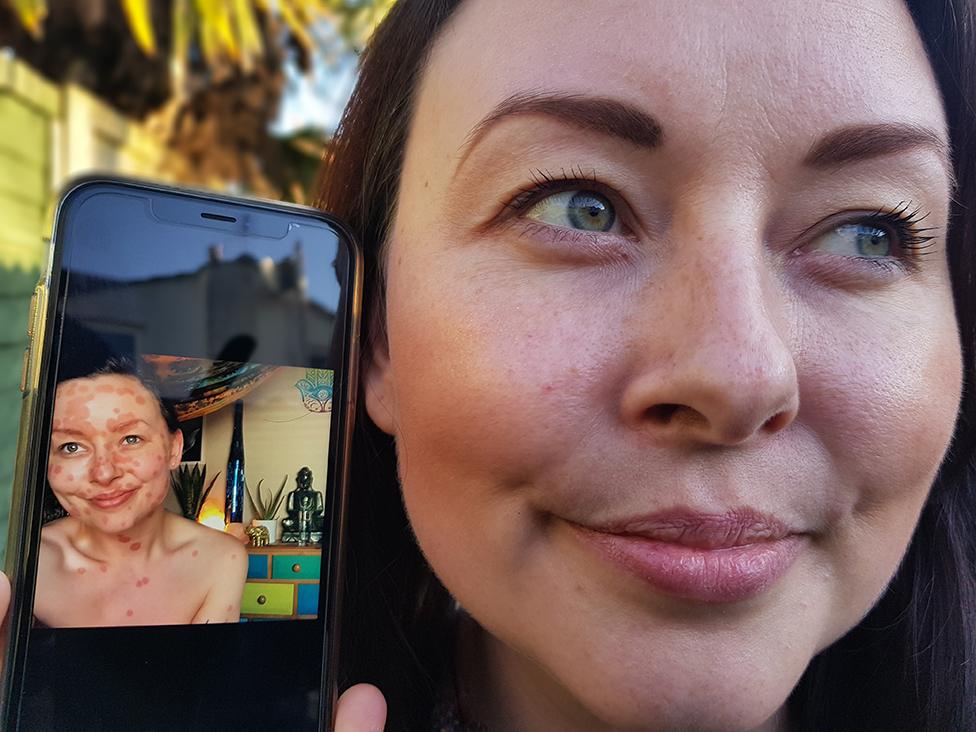
During a severe flare up, the psoriasis started on my forehead. First it was just small spot-sized dry patches, and they grew. Eventually, each patch merged with each other, creating much larger patches of dry skin crossing my entire forehead. Both eyebrows were completely affected, and then it spread down the sides of my nose, around my mouth, until, it was pretty much dotted all over my face, neck and body.
I constantly had this tingling, burning sensation on all of the patches that covered my face and my body, and it affects my scalp the most. During my flare up, I started to notice a lot of hair loss. At one point my hair was so fine, it was a few strands that I could just hold together. What I ended up doing was buying wigs to make myself feel better.
Sometimes it would get bad enough that it would feel like an open wound. Even the feeling of my clothing touching my psoriasis would be completely unbearable. I love all my clothes and I love fashion. I could only wear fleece-lined leggings and big baggy jumpers that were fleece-lined. I couldn't wear bras or knickers any more, so I had to wear cycling shorts so that the elastic didn't cut into my skin.
When I first got guttate psoriasis (which causes small spots or papules), I was misdiagnosed with chicken pox. Over the next few weeks, I ended up staying at my mum's. She set me up a little bed in her room. What I couldn't cope with the most was that initial feeling in the morning of remembering how I now looked and having to accept it all over again. My mum was always ready, bless her, always at my side, waiting for me to wake up. I would just burst into tears and she would comfort me and tell me I was beautiful. Remind me that she would get me all the help that she could get me.
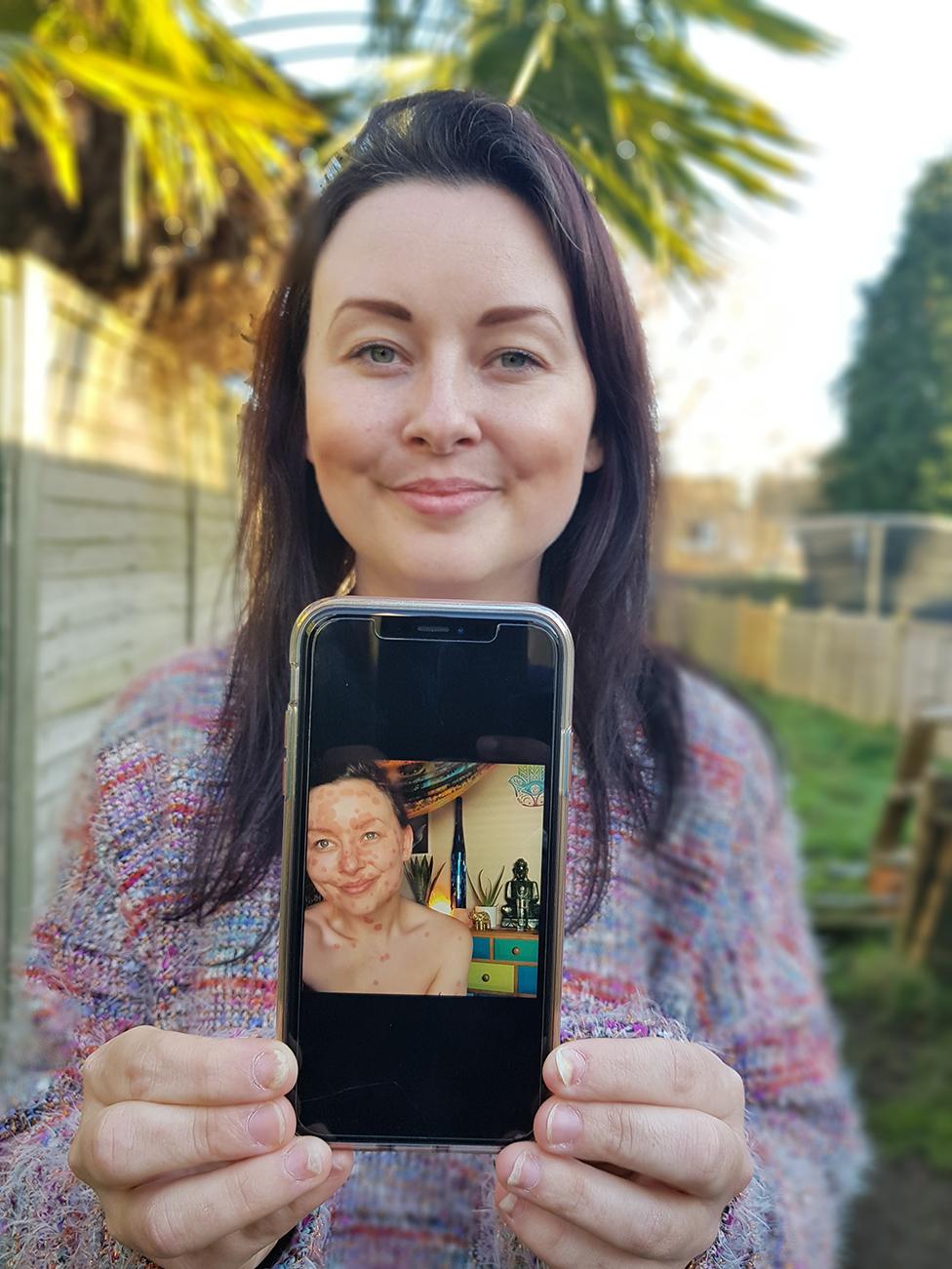

You are aware of other people's reactions. At work, customers would say to me, "Can I not be served by you, because you've probably got something contagious."
I work in retail, so I'm selling fashion. I just found myself initially saying, "Yes, that's fine. I'll get someone else to serve you." It didn't take me long to be able to say to people, "I'm not contagious, I'm absolutely fine, and so either you're served by me or you won't get served."
All of my friends and family were really supportive. I was single at the time. I didn't expect to meet anyone during a flare up until I met my partner. When I first met him, he had absolutely no questions about my skin at all. He didn't query it, didn't look at me any differently, just approached me and said, "Wow, you're beautiful."
People started to contact me once I had my initial photo on social media and say, "You're really inspirational." That was when I had to embrace it and I thought, "Wow I don't think I would ever have considered myself an inspiration to anyone."
Aimee, 34, from Kent
Interviews conducted by Ena Miller for Woman's Hour, broadcast on 4 August, 6 August, 11 August and 13 August.
Text interviews shortened and edited for clarity by Lucy Wallis.
Help and advice

You may also be interested in:
Sylvia Mac has spent most of her life trying to conceal the extensive scars which cover her body - the legacy of a childhood accident. Here she explains why, at the age of 48, she decided it was time to stop hiding and come out into the open.
